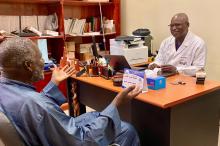Understanding Africa’s prostate cancer prevalence, risks and prevention mechanisms
Dakar ‒ Prostate cancer is one of the most common male cancers on the African continent. Studies report high incidence and mortality rates among African men compared to men of other origins. This is explained by a combination of biological, genetic and social factors. Research shows that men of African descent are more likely to have genetic characteristics associated with more aggressive and harder to treat forms of the disease. Additionally, the low level of health system readiness in most African countries particularly in diagnosis and treatment capacities combined with limited awareness and restricted screening programs, often leads to late diagnosis, thereby reducing survival chances.
Professor Papa Ahmed Fall, a strong advocate for early detection of prostate cancer and Head of the Urology/Andrology Department at Dalal Jamm Hospital in Dakar, discusses prostate cancer prevalence in the region, its risk factors and methods of prevention.
What is the prevalence of prostate cancer in Africa?
The prevalence of prostate cancer in Africa is increasing, making it a major public health issue. While exact figures vary across countries, studies indicate a growing incidence, driven by aging populations and improved detection methods.
Globally, prostate cancer is now the second most common cancer in men after breast cancer, with an estimated 30 cases per 100 000 people in Africa. This number varies significantly by country, with higher rates observed in North African nations like Morocco and Tunisia, and in South Africa.
In Senegal, for instance, around 250 to 300 new cases are diagnosed annually, making it one of the most frequently diagnosed cancers in men. This increasing trend is largely attributed to aging populations and improved diagnostic methods.
What are the risk factors for prostate cancer?
Several key factors influence an individual's risk of developing prostate cancer. Advanced age stands out as the primary risk factor, with most diagnoses occurring in men aged 60 and above, though cases in younger men are increasingly being reported.
Race also plays a significant role. Black men, including those of African American and Caribbean descent, face a higher risk compared to Asian or Hispanic men. Interestingly, when prostate cancer does develop in African-American and Caribbean descent populations, it often manifests at an earlier age.
Beyond age and race, genetics are a crucial component; we can also notice that a family history of cancer notably elevates one's risk. Furthermore, certain environmental factors, particularly a diet rich in animal fats, are considered key contributors to prostate cancer development.
How can prostate cancer be prevented?
While there is no foolproof way to prevent prostate cancer, adopting healthy lifestyle habits can significantly reduce the risk.
Regular physical activity is crucial, not only for overall well-being but also for prostate cancer prevention, as it helps in avoiding excess weight, itself a risk factor. A healthy diet is equally important: reducing the consumption of fats and red meat and incorporating foods rich in beneficial compounds like lycopene (found in tomatoes) and selenium (found in nuts and legumes), is thought to play a preventive role.
Beyond lifestyle, early detection is essential for increasing the chances of survival. Screening tests typically involve a rectal examination and a blood test to measure PSA (prostate-specific antigen) levels. Although these tests might seem uncomfortable, their importance in detecting early signs of cancer cannot be overstated.
However, a significant challenge in Africa is the limited access to these crucial screening and diagnosis tools, particularly PSA testing and prostate biopsies in rural areas. This often leads to prostate cancer being detected at advanced stages, resulting in higher mortality rates.
While awareness and screening programs are being developed across several African countries, much work still needs to be done to improve prevention, early diagnosis, and access to treatment is vital. This also involves comprehensive information campaigns to combat the disease, address taboos and dispel the harmful misconception that prostate disease is linked to sexual practices.


